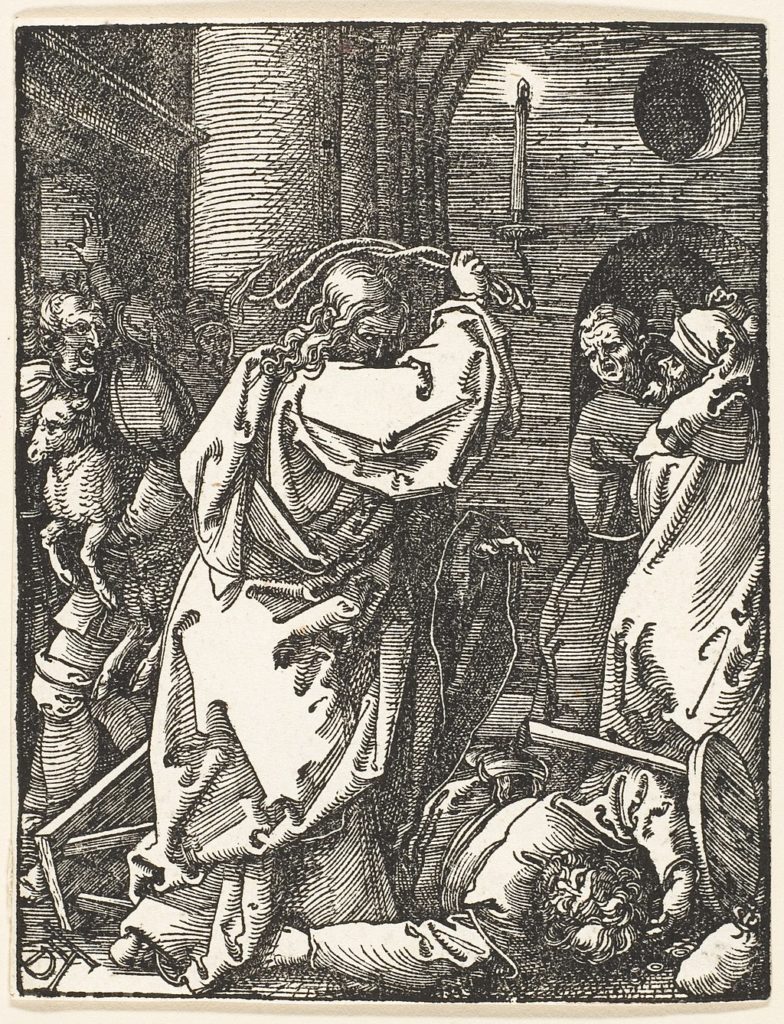After a bitterly cold February in Duluth, we are watching eagerly for signs of spring to tell us how long. A sign is a stand-in: its presence indicates the probable presence or occurrence of something else.
In the First Reading for this Sunday, we hear about other signs. God gives the Ten Commandments to Moses, a list of Thou Shalt Nots for a people who, after generations of slavery, no longer know right from wrong. They ask for a sign that God is with them and God gives it: lightning, thunder, smoke, and a deafening trumpet blast. Moses tells them that these signs are ‘to put the fear of God upon them so that they do not sin.’ Even today, we sometimes need an in-your-face sign to let us know when we are going in the wrong direction.
The account in the Gospel of John of the cleansing of the Temple takes place 1300 years after Exodus. The scene is the vast outermost courtyard that surrounds the temple in Jerusalem. This area has stalls filled with sacrificial cattle and sheep, cages with doves for those who can afford no more, and tables for pilgrims to exchange their foreign coins. The air is filled with the smell of frightened animals and their droppings and with the noise of hundreds of people – especially at this season of Passover, when many come up to Jerusalem for the feast. Jesus and his disciples enter through a gate and he is filled with anger at what he finds.
Why does he object so much to the presence of moneychangers? They are providing a necessary service, exchanging the various coins of the Roman empire for the Tyrian half-shekel that is needed to pay the temple tax. The animal sellers are there to provide unblemished beasts for sacrifice, as prescribed by Jewish law.
It’s not what they were doing, but how, that offends Jesus. They have transformed the Holy Dwelling of God into a vast bazaar, where sellers haggle with buyers over prices, cheat each other, pay bribes to the authorities to keep them silent, and have their own pockets picked by thieves. The Gospel of Mark adds that people are using the outer courtyard for a convenient shortcut across the city, a sure sign that they are not thinking of God. God help me! at times I have done that, taking a shortcut from the monastery’s garden court through the chapel to reach the front sidewalk.
The problem is that people can grow too comfortable with holiness. We forget the reverence with which we should always approach God. For Jesus, even the temple’s outer precinct is sacred. His reaction is not rage but a controlled response to sacrilege. He methodically braids a rope whip and uses it, not to harm people or animals, but to drive them out, and re-establish the courtyard as God’s House. He orders them, “Stop making my Father’s house a marketplace!” and, in the Gospel of Mark, says, “This temple should be a house of prayer for all the nations, but you have made it a den of thieves.”
I can only imagine the chaotic scene as Jesus wields his whip: tables overturn, coins scatter everywhere (with some pilgrims grabbing them up, as though an answer to prayer), the cows bellow, sheep baa, doves flutter away into freedom. The merchants and moneychangers duck away from the whip while protesting their innocence in the face of such righteous anger. His actions outrage the temple officials and alarm the Roman soldiers who are there to keep the crowds quiet.
“Zeal for Your House consumes me.” The disciples remember these words from Psalm 69, a cry from a heart that loves God deeply and is ridiculed for his faith. The psalm continues, “Insults have broken my heart, so that I am in despair. I looked for pity, but there was none; for comforters, but I found none. They gave me poison for food, and for my thirst they gave me vinegar to drink.” We will hear an echo of these words in a few weeks: as Jesus hangs on the cross, mocked by passersby, and is offered sour wine by his executioners – a sign, to those who pay attention, that ancient prophecies are coming to fulfilment.
The temple officials ask Jesus, “What sign can you show us that you have the right to do this?” He replies, “Destroy this temple, and in three days I will raise it up.” Signs, again. We demand proof before we will believe. The officials see this as a sign of hubris. For John, it foreshadows Jesus’ death and resurrection, and prophesies the eventual destruction of the temple that will sweep away the long tradition of animal sacrifice to make room for the perfect covenant between God and humankind.
Jesus is moving us beyond the need for a sign, for requiring proof. In the second reading, Paul takes up this theme in his first letter to the Corinthians. “Jews demand signs and Greeks seek wisdom, but we proclaim Christ crucified, a stumbling block to Jews and foolishness to Gentiles, but to those who are called, Christ is the power and the wisdom of God.”
Because Jesus died and rose, we no longer need signs to believe. God calls us directly, in that still voice speaking in our hearts.
What conversion of mind, heart, and life is the Lord asking of you today?
 Image: Christ Expelling the Moneylenders from the Temple — woodcut by Albrecht Dürer, CC0, via Wikimedia Commons
Image: Christ Expelling the Moneylenders from the Temple — woodcut by Albrecht Dürer, CC0, via Wikimedia Commons